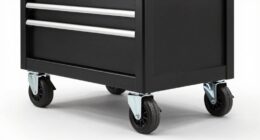To manage waste and recycling in your workshop effectively, start by clearly separating hazardous waste, recyclables, and general trash using designated containers. Follow safety guidelines for storing and labeling hazardous materials to prevent spills and accidents, and educate your team on proper disposal practices. Stay compliant with local regulations and adopt eco-friendly habits to reduce landfill waste and conserve resources. If you want to develop a thorough waste plan, there’s more to learn about best practices and compliance.
Key Takeaways
- Implement a waste management plan that separates hazardous, recyclable, and general waste at the source.
- Use clearly labeled, dedicated containers for hazardous materials and recyclables to ensure proper handling and compliance.
- Train staff regularly on safe disposal practices and recycling procedures to minimize contamination and accidents.
- Follow local regulations for waste disposal, recycling, and storage to avoid fines and environmental harm.
- Regularly review and improve waste handling processes to enhance sustainability and reduce landfill contributions.

Have you ever wondered how effectively managing waste and recycling can make a difference in your community? When you take steps to organize your workshop’s waste properly, you’re not just keeping your space clean—you’re contributing to a healthier environment and guaranteeing compliance with local laws. One of the most critical aspects of waste management in a workshop setting involves handling hazardous waste safely. Hazardous waste includes materials like solvents, paints, batteries, and chemicals that can pose serious health and environmental risks if not disposed of correctly. To prevent spills, leaks, or accidental exposure, you need to understand and follow proper procedures for storing and labeling these materials. Using dedicated, clearly marked containers can help you segregate hazardous waste from regular trash, reducing the chances of contamination or accidents. Additionally, proper storage and labeling help ensure that hazardous materials are managed in compliance with safety regulations. Recycling regulations play a crucial role in guiding your waste management practices. These regulations specify what can and cannot be recycled, how to prepare materials for recycling, and where to deliver them. Understanding and adhering to these rules ensures you’re doing your part in reducing landfill overflow and conserving valuable resources. For example, many recyclable materials like metal, plastic, and paper must be cleaned and sorted before recycling; neglecting this can cause entire batches to be rejected or sent to landfills. Staying informed about local recycling regulations helps you avoid fines or penalties and demonstrates your commitment to sustainable practices.
Implementing a waste management plan in your workshop requires discipline and awareness. Make it a habit to separate waste at the source—have designated bins for hazardous waste, recyclables, and general trash. Regularly review your waste streams to identify opportunities for improvement. Educate yourself and your team about the importance of proper disposal, especially for hazardous waste, which demands special handling. Keep safety data sheets accessible for chemicals to ensure everyone understands how to handle and dispose of them properly. When it comes time to dispose of hazardous waste, always use licensed disposal services that follow hazardous waste regulations. This not only keeps your workshop compliant but also helps prevent environmental contamination.
Frequently Asked Questions
How Do I Dispose of Hazardous Workshop Materials Safely?
You should always follow proper disposal procedures for hazardous waste. Carefully label and segregate hazardous materials, then store them in approved containers. Contact your local waste management authority for specific disposal guidelines, and never pour hazardous waste down drains or onto the ground. Use licensed disposal services for safe removal, ensuring you comply with all regulations. Always wear protective gear and handle hazardous waste with caution to prevent accidents and environmental harm.
What Are the Best Practices for Recycling Metal Scraps?
Did you know that recycling one ton of metal saves 1.1 tons of iron ore? To recycle metal scraps effectively, you should focus on proper metal sorting and scrap collection. Separate ferrous and non-ferrous metals, and use clearly marked containers for each type. Regularly inspect and clean your scrap collection areas to prevent contamination. This not only improves recycling efficiency but also keeps your workshop safer and more organized.
How Can I Reduce Waste Generation in My Workshop?
To reduce waste generation in your workshop, focus on material reduction by carefully planning your projects to minimize excess. Optimize your workflow efficiency to prevent overuse of materials and reduce errors that lead to scraps. Use precise measurements and proper techniques to avoid waste, and consider recycling or repurposing leftover materials whenever possible. These steps will help you cut down waste, save costs, and make your workshop more sustainable.
Are There Any Grants or Incentives for Recycling Efforts?
Yes, you can access recycling grants and government incentives to support your efforts. Many local and national programs offer funding or tax credits for recycling initiatives that reduce waste. Check with your city or industry associations for specific recycling grants available in your area. Applying for these incentives can help cover costs and motivate sustainable practices, making it easier to implement effective recycling solutions in your workshop today.
How Do I Manage Waste From Electronic or Hazardous Tools?
You should separate electronic waste and hazardous tools immediately, storing them in marked, sturdy containers to prevent leaks or injuries. Contact your local hazardous waste disposal facility or recycling center to arrange proper collection. Never throw electronic waste or hazardous tools in regular trash, as they contain dangerous materials. Following local regulations guarantees safe disposal, protects the environment, and keeps your workshop compliant with health and safety standards.
Conclusion
By managing waste and recycling effectively, you turn your workshop into a well-oiled machine, where nothing goes to waste. Think of your waste as a river—flowing and changing—but with the right practices, you can redirect it toward a cleaner, greener future. Keep organized, stay committed, and let your efforts ripple outward. Every small step you take today plants the seeds for a more sustainable workshop tomorrow.









